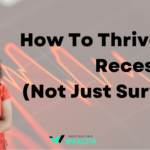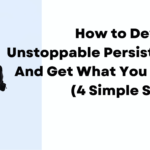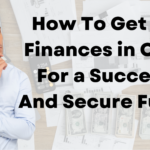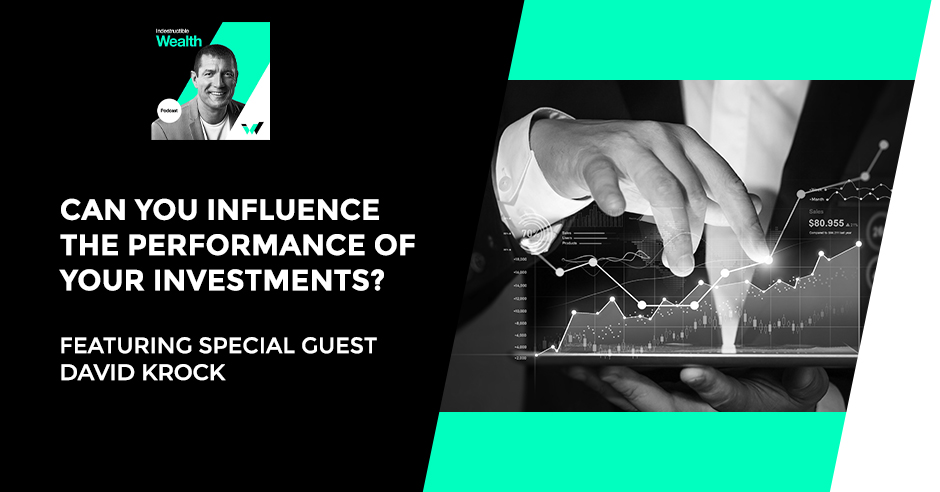
How are you investing during this volatile time? How do you decide what is a worthy return on investment? In this episode, I speak with David Krock of Permavantures about how he built a wealth-generating company via a nontraditional path. (Hint: He invested in himself via books and coaching). Tune in and learn how to get in now.
My book, “Building Indestructible Wealth: The Six Figure Earners Guide to a Multimillion Dollar Portfolio,” just launched. Get your print and audiobook copies and a few other timely insights into what to invest in right now at this link: https://bit.ly/3xjGFQ7
Do you have a question you would like me to answer on the podcast? Follow me on IG: @indestructiblewealth and send a message, or visit me at www.myindestructiblewealth.com for more resources.
You can find David at https://perma.ventures/
—
Listen to the podcast here
Can You Influence The Performance Of Your Investments? Featuring Special Guest David Krock
In this episode, I interviewed Dave Krock. He is a long-time friend of mine. I met him at an entrepreneurial group locally here in my hometown of St. Joe in Michigan. We have forged an incredible relationship. This guy is very smart. He is going to teach you and talk about the difference between investing in businesses that are going to give you control over the cashflow versus businesses where you have no control but you are buying on speculation. He is also an early Bitcoin adopter. We love him for that. I want to introduce you to our special guest, Dave Krock.
—
I got a friend on the show. I know you are surprised that I have friends but I have a handful. One of them is here and he is a serial entrepreneur. He is going to talk to us about controlling cashflow versus waiting for capital gains. Dave Krock, thanks for joining us. I appreciate you being here.
We have never had a conversation like this that has been recorded. We have been in front of groups of entrepreneurs before, doing live talks, round tables and mastermind-type dynamics but never done anything together on a show like this. You are able to find these official formats with no booze and probably cleaner language. I don’t know.
We could add the booze easily. It is noon and that could present a problem. I might need to take a nap. As far as the language goes, my audience is pretty used to explicit lyrics. Whatever that term is fine. You were hard to track down to do this episode for as little fame as you have.
You punch above your weight.
Dave, tell us a little bit about yourself. How do you get started in your entrepreneurial pursuits? You are a serial entrepreneur. That means you have multiple businesses and things you are invested in and actively building. We need to know about this. Let it rip.
Long story short, I was a musician. This is late high school in my early twenties. I’m a musician in an alternative rock band back in the ‘90s.
What’s it called?
I’m not going to share that name here for the public. Partially because there is some copyright stuff but this is an alternative rock band based in Chicago, where I grew up. I was doing the music thing, playing live shows and graduated from high school. It was going pretty well for an 18 to 19-year-old who needs to live on, “It was great money in the late ‘90s.”
I had everything I needed and enjoyed what I was doing. I never went to college. I didn’t pursue that next step from an education standpoint. Eventually, I started doing some things on the production side of the industry and decided to start a recording studio with somebody I had met. We thought this was going to be great. We know exactly how to make a great album. We know how to make a great musical product that people want to listen to. We should know how to create a business doing this. There is nothing else that I have to think about other than making a great musical product. There is nothing else I need to know about having a plumbing business other than how to turn a wrench.
This is where I was at the time, young, inexperienced and didn’t know what I didn’t know. We get started on this thing. I put, at that point, my meager life savings into what we got going on and do the people walk through the door. We can’t wait for them to show up and make records. It was an eye-opening experience when you got the doors open. You are at that point where you have launched and you realize, “There is a lot more I’ve got to do to make this thing work. People need to know about us and why they should come to our studio versus somebody else’s.” There are lots of real-life business stuff that I had to learn.
Money is all about mindset, knowing how to make it work to your advantage as opposed to you working hard for it. Share on XMeanwhile, you are shoveling money out for rent, expenses, electricity and all that stuff. There was that ongoing support of what needed to happen to get things started. Eventually, I couldn’t do it right. I couldn’t afford to shell more money out on a monthly basis. I reached that point where eventually, income could cover those expenses. I had to get out of that deal. I was left with a bunch of debts. For the first time, I had debt.
I was at this point where there wasn’t an obvious next step in my life. Things had gone well through high school in terms of the music thing and it was obvious what was next for me. I didn’t go to college, never got out and built a resume to work in applying for jobs or at least finding sources of income. I had one of those oh-crap moments where I got no income. I have debts. I don’t have anywhere to go, any resume or money. I would live at the library.
One of the things that my parents taught us early on, which I’m grateful for, is the love of reading. I do enjoy 1 book or 2. That is what I did. I went to the library and was like, “Where do I start? I got debt. Maybe I will read about how to get out of debt.” I grab some random book about how to get out of debt. I was like, “I got no money and I have to live. How does one live cheaply?” I grabbed another book on living frugally and helped people.
I eat out of the vending machine at the library. This is me all day at the library. It is like living in my car. Fortunately, my parents would allow me to crash overnight at their house but I live at the library and absorb information. I was like, “I got to do this next. This is how you think about money.” All stuff that none of us are taught in school. I had no background in this. I grew up in a blue-collar, lower-middle-class neighborhood. Nobody else in my neighborhood knew anything about how money worked other than you work hard for it. You trade your hours for those dollars. Hopefully, things will go well. In the end, maybe you got something left and the government will take care of you.
I had no real mindset about what business, investing and entrepreneurship was. As I’m reading, I start laddering up that conversation or those different subjects from getting out of debt to personal finance, to investing to different types of investing. Some people invest in real estate. How do they do that if they have no money? The next book over is how to invest in real estate with no money down, those kinds of things. I pulled that one off the shelf.
Eventually, I started absorbing all of this information. Another thing important to know about me is I’m fundamentally unemployable. I don’t respond well to static systems and processes. I like to create them but I’m not a good person to operate those processes. I don’t follow directions well if I can find a hole in it and all that stuff. I was in a place where I knew the usual career path was not going to be for me. I knew I needed to find another way to earn a living and put my stamp on the world than go to work, get a nice, safe, secure job and all that stuff.
I started reading more books and eventually read a book called Rich Dad Poor Dad, which you are familiar with it. I’m sure many of your readers have already read it. If not, you should. That is a good one to read but the premise is it is all about mindset. It is all about how you think about this resource, that is money and how to make it work to your advantage, work for you as opposed to you working hard for it. The author also talks a lot about how you can use leverage points to get further along than the amount of money you have to leapfrog some of the learning curves around what you need to do to increase the amount of money you are working with and a good bang on your buck for when you spend or invest money.
Those things were all mindset-based concepts. It opened my mind a significant amount. I started realizing, “This path of entrepreneurship and investing allows me to be creative, create things from nothing, choose my adventure and path and be able to have the resources I need to maybe level up outside of the socioeconomic areas that I was in or towards things that I always wanted to do in life.” I started hacking away at it.
I filled my head with knowledge and eventually met some other people. We started an entrepreneur’s group. It was more or less a meetup. It turned into hundreds of members and lots of people would come together every month. I kept filling my head with knowledge. Some opportunities started to emerge to put that knowledge to use coming from that group. That is a long story short.

Influence Investments: Strong investors are constantly learning all the different ways they can use leverage and tactics.
Fast forward, that has turned into a lot of different business opportunities. I have a holding company called PermaVentures. Underneath that holding company, we have lots of different industry verticals, technology, real estate, hospitality, events and things like that. We have launched some of our businesses, acquire companies outright and invest in other amazing people that are doing great things. It is one hell of a journey, that is for sure.
I want to dive into all the different ventures that you are in. This building a platform like what I’m doing, where I’m building a show, writing a book, having courses and offering one-to-one coaching and content creation, I had no idea how hard it was going to be but at the same token, every business that I have started, which is essential but it is the 3rd or 4th, 3.5 businesses I go with, is spent very hard.
You had a music business. You were a startup. It sounds like that was hard. You didn’t know what you didn’t know when you got into it. There was a lot more to it than just pressing the record button and recording and we are good. There is so much more to the business than that. Starting up businesses is not easy from scratch. It sounds like you had the same thing.
One of the things I had to learn early on was how to turn $1 into $2. I had $1. I can remember points looking at a bank account statement and seeing $3.47 in the bank account. You were like, “Between now and tomorrow, we are going to need to put a few more into that bank account to have what we need. How do I do that?” You think about fast-forward to larger numbers.
If somebody is able to turn $1 into $10 in 24 hours, we are talking about the best investors in the history of the world type dynamic. What is weird about that is you don’t know what you don’t know. The difficulty level goes up but the same principles behind how do I turn $1 into $2 are the same as how do I turn $100,000 into $200,000? It is the different types of applications of where situationally, how the landscape looks for you and where you can deploy $100,000 versus $1. There are fewer amounts.
I think of Warren Buffett. They have $100 billion in cash on a routine basis at Berkshire Hathaway. It is hard to deploy $100 billion in cash without moving the market significantly. He also sits and waits for long periods for the obvious next step. Learning how to turn $1 into $2 got me into that return on the invested capital mindset. If you do that and compound that long enough, it looks boring for a few years but you get to the point where you have what you need and the basics are taken care of.
As you have seen these exponential curves, what happens in compounding is things start to take over that you don’t have an understanding of how they are working. It is not $1 turning into $2 and then $2 turning into $4. All of a sudden, you are four times where you were at that point in time. For me, my target was always 50%. I always wanted to be able to add a path to what I have invested in within a year. That has been one of the targets I have looked at over time. That is one of the things that naturally, by having those constraints, started to become part of my mindset and reading about it too. You hear how strong investors are constantly learning all the different ways that they can use leverage and tactics.
I love the fact that you were reading for extended periods. You realized, “I need to invest in myself and my mind.” Stage 1 in my 5-stage process that I teach about growing wealth and creating a multimillion-dollar portfolio is investing in yourself. That is books, podcasts, courses, seminars and one-on-one coaching. I have coaches in multiple areas of my life because they leveled me up. They taught me things and shortened my learning curve. You did that with books in the library.
I had no access to a great coach. One thing I did have access to was some of these books.
The first rule of investing is you don't ever want your bankroll to go to zero. Share on XHow much do you give credit to that where you are? You take that away from Dave Krock, the library card. We have those in the early days. Where is Dave Krock now? How important was that?
If you want to draw a linear path from this thing that happened led to this and led to that, it doesn’t happen. The path is different. Maybe I don’t end up being an entrepreneur. Maybe I do. Who knows? If I’m looking backward through the timeline, it does not happen. Me reading Rich Dad Poor Dad led me to Robert Kiyosaki’s online forum that he used to have on the website, which led me to meet a bunch of people who lived in my area, led us to meet up, led to that group that I talked about and led to my first opportunities to deploy some of these things I learned to support and help other businesses.
My first real business, after the recording studio, was as an entrepreneurial coach. I would work with an entrepreneur, sharing all of the stuff that I had learned that I could see could be applicable to their business and we would grow their business. It was business development, consulting and coaching but primarily I was working on the person. It was something that the person was doing or not doing that was holding the business back.
We start to work on those unlocks. I got sick of watching their businesses explode and decided to start something of my own. At that point, I was trading hours for dollars. I’m back to that mindset but they were 10X to 100X what I could make going to work for somebody else, which is the beginning of that life-changing step of what was possible monetarily.
Let’s dive into the main subject and there are a lot of things that are going to branch off. We want to hear about your ventures. This is the question that is critical for the readers to understand, especially in our economy and marketplace, where assets are volatile. The concept of the question is what is better, investing for cashflow where you are buying an asset, whether that is a piece of real estate, a business or a bond, you are buying an asset for the cashflow that you can control or you buy something and you wait, pray or hope that it goes up? It is a speculation. Do you have a preference between the two? What does that look like?
At different points in time and different types of things, the preference may change back and forth between those two. There are types of investments that allow you the opportunity for both. Real estate is a good example historically of that at different points in time. With all things that you are investing in, it is important to look at what you are trying to achieve. What are the skillsets, assets and resources that you have available to you to try and make that opportunity go as well as it can? If you don’t have the opportunity to influence what is happening that you are investing into, one good example of that would be public stock markets.
Not many of us get to sit in the boardroom with the CEO and the board members of public companies like Amazon, Apple or anything like that. We might invest in that stock because we believe that it’s headed in the right direction and over the long-term, there is either preservation of the number of dollars we put into that stock. The money will hold and ideally, we think it will grow. When we are thinking about what we are doing, we are creating new cash from existing cash. The same thing is true at the base level of both of those strategies. You’re trying to create new cash from existing cash. The question becomes the profile, the type of cash that is being created and the different ways that you can utilize it.
Let’s move from the Apple and Amazon analogy to one of our businesses. If we start a business, we will say that we are selling flowers. We set up shop and started selling flowers. The next thing you know, we are making $10,000 in profit in the first year. Those dollars at Amazon, the board, the CEO and the company gets to control what happens to those dollars. The $10,000 in our flower shop, we control what happens to that.
We could pull all that money out. We could decide to reinvest it in that business. We could decide to invest in more supplies and inventory because maybe we will get better buying power by buying in bulk. We might buy a supplier. We might buy a greenhouse and then we are growing our stuff. Instead, previously where we were buying it.

Influence Investments: With all things you’re investing in, it’s important to look at what you’re actually trying to achieve. What resources are available to you to try and make that opportunity go as well as it can?
The control over the dollars itself, especially in the early days when you are getting started and building the pot of money, you have to work with your bankroll. Think about it. You have a pile of money, however big it is, $1 or $1 million. You are trying to make it grow and do something with it that is going to be supportive of your life over time, whatever those goals you have. You are trying to manage that bankroll well. You don’t ever want it to go to zero. That is the first rule of investing. Don’t lose that bankroll.
You think about what are the things that could cause that bankroll to go to zero. What does the world look like? What do the avenues that I think I can invest that money in look like, comparatively speaking? Once we have either ruled out that it is going to go to zero or have mitigated it, what happens if it loses value? We have more options with that. In a business you control, you’re building an asset. A flower shop that I own that, hopefully over time somebody else’s managing the operations of and I don’t have to be active in the day-to-day. It is now a sellable asset. Somebody else could step into my shoes as an owner. They would have that $10,000 a year of cashflow that they could control.
What is that worth to them? It is not worth zero. I paid nothing for it because I built it. Theoretically, you put money in overtime to support the operations and things like that. There is a certain definable amount of money that you put in. I’m going to say to this remains constant. It is spitting off $10,000 a year. If it took you $100,000 to get it up and running, you got a 10% return every year. You got $100,000 worth of assets into it. What is that worth? Could you sell that to somebody and they would be willing to accept a 7% return? If so, that means that the business is worth more than you have put into it asset-wise. You have some appreciation and growth of that initial capital.
That would be an example where you potentially would have both of the things that you were talking about, Jack. The growth of the asset is hoping that it appreciates and goes up in value and the cashflows that the business throws off that you get to control. Especially in the world we are living in, having multiple avenues of ways to realize that $1 turns into $2, that growth of the bank is important because it is an uncertain world. A lot of investments are incredibly volatile.
If you ever need to remove your money from one of the investments that you are in, in a volatile world, the prices are going up and down at a rapid rate, a much faster rate or a much more frequent rate up and down than we are used to. If you don’t know when you need to pull that money out, that creates a lot of uncertainty because you don’t want to buy high and sell low. Those are some of the things that I think about when I address that question. I do think there are assets that I’m invested in over the long-term that strongly is going to be worth more in the sheer value of them and the market agrees that they are worth it.
A good example of that would be Bitcoin. Over the long-term and if you stretch out the period that one has owned Bitcoin over its several-year history, in a four-year window, nobody has ever lost money. Over the course of its history, it is compounded at 170% a year. People have lots of reasons why they would believe that that would continue, not continue, what the value of that asset is or the role it plays in the world and all those sorts of things. I have a strong conviction and thesis around it. I believe, over the long-term, it is going to hold its value and continue to grow.
It doesn’t throw off cashflows. There is no yield in itself holding the assets. It is like holding gold. There is no yield right there. Your belief is that this thing is going to retain its purchasing power. At the end of the day, all investing is growing one’s ability to spend that money or your future descendants to spend that money or society if you are giving it back through foundations. You are growing the future, purchasing power or future optionality of how you could use that money in the future for you or your descendants.
We are talking about a situation like you gave us some examples where when you buy an asset, for example, any stock and in all likelihood, like you said, “We are not on the board.” We don’t get to decide when Amazon and Apple make money. Theoretically, they could kick out all profits back to the shareholders in the form of a dividend. That would increase the cashflow significantly.
However, there is also the downside that they are not using those profits to reinvest back in and grow the company further, which is going to grow the share price. That money is not taxed until you go to sell. When you do sell after, if you wait and hold for more than a year, that increase in equity that you realized that tax is significantly lower too.
Investing is just growing the future purchasing power of how you could use that money in the future for you or your descendants. Share on XThere is a big tax looming question on controlling the cashflow yourself versus buying something that goes up in value. When you start hitting a certain amount of income and buy more assets that produce more cashflow, you are, in essence, potentially paying upwards of 50% in taxes. Is that an example of a situation that would more or less dictate or steer you in the direction of investing for an asset to go up in value versus buying it for cash?
Those are some of the things that you look at when you are assessing these things. I mentioned the landscape. What is happening in the world? What is the current regulatory and tax regime? Are gains or pass-through income from a business tax at 50%? Are they taxed at 5% or the tax at 99%? All these things matter in terms of what you do and the actions you take.
To me, a tax is almost like paying an investment management fee. It is a drag on the velocity of money, the compounding and all those things over the long run. In actuality, if that is all you optimize for, you only optimize for paying the government zero taxes every year and for having the lowest amount of fees on your investments. You are retrying to generally build wealth and that’s all you focus on. That is a losing strategy. Those things help you win more by focusing on those areas. The optimal metric there is how much I can pay the government.
Assuming I utilize all of the tax reduction strategies that are out there for whatever type of business I’m getting into or investing I’m doing. The measure of success is how big a check I can write the government. It is only some portion of what I get to keep. I’m doing well if I write a bigger check to the government every year. If I have the opportunity to, on whatever I’m building, pay less to the government because of some tax strategists, it is great but that is the optimization of some of the minor points. That is not getting the major big points.
The major big points are, how do I deploy capital in a way that other people may not think to do so? There is not a crowd of dollars going after those assets or business types but you believe, over time, that what you are investing into or pursuing is going to be truly valuable to the market. Either if you’re looking for appreciation of that asset, you are waiting for the market to come to you. Over time, they will believe that that thing is worth more and want to pay for it or you are providing value in the world through your business and people are going to want to utilize that business over time.
Those are some of the things that I think about. Taxes matter but, at the end of the day, you are better off optimizing for the things that do lead to true growth, good compounding of your dollars and growth in you as an asset. You, as an asset, are making decisions about where to deploy, what capital, what bank role you have and how to manage your emotions and decision-making is the single biggest thing that you can focus on growing the capability of that asset that is you.
Jim Rohn said, “One of your goals should be to become a six-figure taxpayer.” He was like, “You are paying six figures in taxes. The rest of it that you get to keep is pretty substantial. You want to be paying that money in taxes, not trying to eliminate and avoid them altogether.” I want to keep them as minimal as ethically and legally possible. If I’m stroking a couple of hundred thousand to the government, that means there is a pretty huge chunk left for me too. What do you get going? How many ventures are you in? How many businesses have you started versus acquired? What does your portfolio of businesses look like?
I don’t know the number of businesses that we are involved directly that we have invested in because there are few layers to it but I have personally started more than 25. This is going in and deciding what the business is going to be about, how to rally the resources together, get the things started, get the brand built, get launched, get the thing to some level of revenue sometimes up to cashflow positivity and hopefully groom or hire in leadership to help run the business.
I have done that twenty-five times. We have acquired more than twelve in some way, shape or form, partially or in whole companies. We have invested in it a ton more. The companies we have invested in and I’m not talking about like we have made some public stock investments. I’m talking about private businesses that we have invested in some way.

Influence Investments: If you’re trying to build wealth but optimizing for paying the government zero taxes every year, that’s a losing strategy. You’re better off optimizing for the things that lead to true growth.
It would appear that you prefer investing in private businesses, whether you start them yourself or buy them existing cashflowing versus publicly on the markets. Is that not true?
That is a preference. The biggest thing you can focus on is your capabilities and decision-making as an investor. If you are an entrepreneur or you want to be an entrepreneur and you don’t think you are an investor or you don’t think that investing is part of that, that is a huge mistake. Every entrepreneur is an investor. You are allocating resources, even if it is your blood, sweat and tears, into something. You are deciding, is that a good investment? Is it going to pay off in the long-term? How much can I win by investing in this?
As you are deploying capital, resources, time, energy, partnerships and whatever other resources you have available to you as you grow over time, you are a capital allocator. That is what investing is. I have chosen private markets primarily. Barriers to entry are lower. You got a little bit more gray space to operate in from the standpoint of not as many people knowing what you are doing and who you are. Competition is a little more fragmented.
Typically, there is professionalism that starts to creep in over time as markets get more mature and some companies go public. What we are looking for are outsized returns. We are looking for markets and things that we can compete in where the difference between the worst player and the best player is why it’s possible. We know if we can focus on serving people, customers and employees well, with good strategy, good systems and all those sorts of things, we can outperform the competition a little easier.
Can you give me a couple of examples of businesses that you have acquired, what they looked like and how they were valued? What was the valuation or purchase price of those businesses? How did you arrive at that? Here is my thought, one more thing to add before you answer the question, this is a huge opportunity over the next decades for primarily one reason.
The Baby Boomers have been the largest market segment that the US has ever seen. They are entering and a lot of them are past retirement age but they are still holding onto their businesses and they want to sell them. They want to close them out but because they are privately owned, there is not this easy liquid market like what you can get on in a couple of clicks of the button.
You can sell crypto at midnight, instantaneously, anytime a day, 24/7 stocks. You got about half or even a third of that amount of time but it is still a pretty liquid place where you can press a button and instantaneously sell the business that you own. Whereas buying a private business, there are a lot more challenges to doing that as the seller and as the buyer. That is a huge opportunity, in my opinion.
I have been looking into this, where, in my real estate company, we have put an offer in. We are about to acquire a tax firm because we want the client list of accredited investors that we can then build a relationship with and get them to buy real estate right through us. It is one of those businesses that make a lot of sense for us to acquire versus trying to build that list up from scratch. With that being said, I packed a lot in there but go ahead.
I’m going to zoom out a little bit before I zoom in. You would ask for some specific examples of things we have acquired, how we looked at the valuation, where the opportunity was and stuff like that. I can do that in a second. The thing I’m going to zoom out on is how we think about what we do. At PermaVentures, the way that we approach the marketplace as investors and entrepreneurs is we provide the resources that amazing people need for what is next. That could be a business owner that is selling, somebody that got an idea that they are launching or has an opportunity that specific investment opportunity. We have employees that have started companies that we have backed and things like that.
Real estate investing is a good on-ramp for people to get into building wealth. Share on XWhat that means is we have to have a lot of different colors on our palette to paint with. We need a lot of different crayons in the box. We are working with the 64-pack. That means different deal structures. That is the way I think about investing. We call it PermaVenture. The approach is to create something that has a long-term sustaining, almost like a self-driving flywheel-type dynamic that comes from constantly looking for the investible moment. It is where the right opportunity comes together at the right price. It needs a mix of resources that we have available, which is usually cash at some form of dollars combined with some form of coaching or expertise.
If we have an opportunity to invest in a company that is in the technical space and we can utilize the resources, we have to improve that company and its results. That is a good example. We have invested in venture-backed startups before and then we are building their product. That is an example where the decision to pull the trigger and put a deal together, design a deal from those different resources and stuff, is based upon when the opportunity presents itself in a way that we know, given what we believe about how that individual, a founder, CEO, company, industry or whatever is going to perform over time, it is the right time to do something, design the deal structure with the mix of resources and get it done.
There are different sections of social media, especially on Twitter. We get these groups of people that center around types of businesses that they think are going to do well. There are groups of people that send around home service companies, HVAC, plumbing and things like that because they believe those are going to be durable over time. Some people center around self-storage businesses on the real estate side because they believe that that is going to do well over time.
You start to get these obvious rules of thumb and places to focus that develop and people will share, “You should buy a self-storage business for whatever this times revenue or cashflows.” Some of those rules of thumb start to form over time. We did the same thing internally. We start to form our rules of thumb around different types of opportunities, why we look at them the way we do and what we are willing to pay for those opportunities.
This is one of the reasons why real estate investing has historically been a good on-ramp for people to get into building wealth. There are consistent sorts of deal structures, mechanisms and ways of doing where you can transition. Most people live in a structure, whether they own it, rent it or what this is like and I can take care of it.
You decide, “I’m willing to put up with plunging toilets to get my first asset to start growing things.” You realize, “Every new deal I do, once we are beyond five units or something like that, we are going to make sure we can fit in property management and if the deal doesn’t allow for that. If the purchase price and the cashflows that you are buying aren’t large enough to allow for professional property management, that is not a deal for us.”
There are lots of these things that go into what makes an investible moment, where we pull the trigger and we don’t pull the trigger. If there are no asset classes that are performing better than 10% a year and you have an asset class that you can dominate, it performs at 50% a year and you know something about that industry, you are going to focus on that area.
In the first six months of 2022, I learned about the bond market, treasuries, corporate bonds, municipal bonds and things like that. The bond market performed the worst of any one year since 1780. One thing to think about is over the last several years, people that had owned bonds over time historically were compensated well because there is an inverse relationship between interest rates and bond prices.
As we have driven interest rates lower over the last several years, that means that the value of each bond that you have owned for longer goes up because your bond from several years ago, that is paying 3% in a world in which bonds you can buy and pay 1%. That is more valuable. Bondholders have done well over several years. It is a weird market to get into. It is an interesting group of people that trade in that space but they have done well. A lot of those things are correcting because you can’t have real negative interest rates for long without stuff breaking.
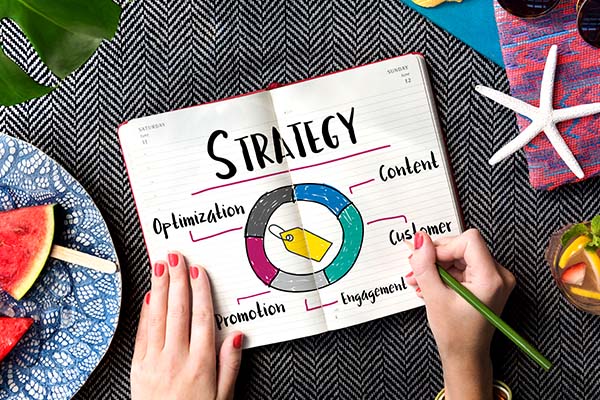
Influence Investments: Businesses that have a strong flywheel and can fly under their own weight are more valuable than ones that are not, even if you’re paying four times as much as you’d pay for another business.
If it is too cheap to borrow money, everybody does. When everybody is chasing things like real estate, single-family homes, primary residences and crypto, there are lots of different areas where people have had easy access to money and have pursued those investment types. They have driven prices through the roof. You start to get those weird corrections that happen. The overall landscape matters in terms of what is a good investment, when is the timing right and how much should one be willing to pay for that thing.
If you think everything has to be up to the right every quarter for that to be a good investment over time, 1) Good luck finding that business. 2) When you do find that business, everybody else knows that is the case for that business and they pile in. It has already been priced in and you would never want to buy that business at that point in time. This is growth stocks in general, Facebook, Apple, Amazon, Netflix and some of those companies that have done well from a tech perspective.
Look at the platform we are on, Zoom. That Zoom stock cranked because many people were getting on Zoom during the pandemic. It crashed like a rock because it was overvalued. Many people bought into that growth and overpriced it.
All they were looking at was the next quarter and what the trend line was. You got to imagine. If you are the investor that trades, you ride those trend lines, you are only in an investment for a short period and you feel like, “I got a year right of this trend going and maybe I will try to sneak in and out.” That is how people trade things. Overall, those types of dynamics rarely lead to long-term compounding wealth. At the end of the day, you got to keep finding those kinds of traits and deals. That is exhausting to me when I think about that.
I want to be out to speak here, read these books, talk to you, think through ideas, whiteboard our butts off, figure out the best position for the long-term over time and let the compounding effects take place over time. In the early days of compounding, things don’t look great but over time, you start to see the effects of that compounding. We were compounding our learning of what it is like to own a hotel or a resort. In the early days, we were like, “It seems to be doing. Let’s let it go.” We realized there were some management issues and debts that had to be paid. The management debt had to be paid by a poor manager. We eventually made a replacement and figured some of those things out.
In my mind, financial statements are lagging indicators of everything you have decided to do in that business beforehand. The keys are always about how you are improving the leading indicators, the things that are happening ahead of time that ultimately lead to financial performance. Halfway through the time we owned that property, we are starting to see some of those leading indicators perform better. We thought we were in a position where we could have sold it. We could have probably gotten our money back, gotten out and done something else.
We were starting to see some interesting things happen. The fact that we were willing to let those interesting things happen versus demand that the next quarter will be amazing allows us the time to try and force a crop to come up that you plant in the spring. We allowed those things to take place. All of a sudden, you start to see those seeds bear fruit and the last few years have been amazing.
You look back over that period. That 3 to 4 years were terrible in terms of the performance or at least to my standards, the performance of cash on cash returns and some of those other metrics we talked about. You look back over the long-term and I’m right there. I can say, “In this window of time, we have earned what we needed to earn in terms of our goals for returns in that business.” There are a lot of lessons in there that I learned that I have applied.
As we got into the pandemic, there were a lot of things that were front and center that were concepts. I had learned lessons with businesses and various things going sideways in a few decades before that I have been doing this. When things get rough, rocky or unexpected and these tail events come back and whip us, almost always in those timeframes, there is some golden nugget of an opportunity. If you are in a trauma, freaked-out state, you freeze. If you don’t spend time looking for those opportunities, you miss out on them. Another lesson that has come to bear is to let things develop over time when you see the positive direction, even if maybe it is not exactly where you want to be quite yet. We are taught to 10X of everything.
Let things develop over time when you see a positive direction, even if it's not exactly where you want to be quite yet. Share on XIt is a strength for an entrepreneur, the impatience like, “What is my next action item? I want to drive this.” That is good. It is also in the investing world of waiting long enough for the investment to play out and give that space it needs to grow. Generally speaking, a lot of entrepreneurs are pretty terrible at that.
I want to back up something you said, “A business could be sold for as low as 2 times earnings or it could go up to 10.” What determines that? How do you arrive at that multiple of how to buy a private business? My next-door neighbor’s business sold for nineteen times earnings, not net income but EBITDA. That is insane. If it is 20 times EBITDA, for every $100,000, they are accepting 5% in terms of a return. We got a huge 2 times earnings, which is you are getting 50% of profits if you buy it for 2 times earnings. In 20 times your earnings, you are getting 5% on your money.
Tell me, what determines that? I know one thing. A lot of it is how much effort you have to put into the business if you were buying it. For example, if you are buying a business and you need to work 40 hours a week, that is going to get a much lower EBITDA than something passive. You don’t have to do anything. You just bought it and collect the cash.
Even the concept we talked about before this. It is about the compounding effect or the things that, over time, come advantages. Sometimes there are those types of dynamics that are baked into a business acquisition that you might pay up for. It reduces your return at the front end but those advantages compound over time.
The thing that goes into the multiples piece a lot is the management function. How much actual work do I need to do? There are many businesses for sale where the owner is inseparable from the business. They are the business. It is some guy or girl that has built a company. They know everybody in their local area that buys from them. People buy because they like them. They want all the counts. When something goes wrong with a customer, they solve it through their relationship. It becomes this thing that is hard to separate. If you can’t separate that individual, regardless of whether you can step in and do a good job, people don’t like you but they like them. That is an immediate loss of some level of value in the company. You have to account for that when you are stepping into these situations.
One of my business partners had a machine shop. It was very successful. He could not find a buyer because every buyer said, “We need you to stay on for a four-year contract.” He was like, “No, I’m selling this because I want to be done. I’m tired of it.” He ended up liquidating the business for the value of the equipment, the building and all of that. He didn’t get the valuation out of the equity that he had built up over the last few decades because it was reliant upon him.
That would be a good example. Is it better for him and the buyer if they pay ten times their earnings and get to do nothing and whatever that number ends up being or they pay for the equipment assets that are depreciating and no compensation for some amount of value that has been produced over time? If the purchase price is $1 million and he was $800,000 of it because he is irreplaceable and someone is paying $200,000 for that business when he thought he was going to get $2 million, it becomes one of those types of dynamics where you got to be able to have that sustainability of the flywheel.
That business turns. When somebody starts a business, flywheels in agriculture. It is this thing that creates momentum that you can use to power different things. It is a physical wheel. It takes a lot of tech because it is heavy. It takes a lot of time to get the first turn going and it takes more energy to get the second turn going. Eventually, it starts to turn under its weight.
That is what you are trying to build in a business. You are trying to utilize all of that upfront energy. We could argue that money is energy. It is a stored energy of your time. You put your time into something. You earn for that. What you have left over is effectively a portion of the energy you put out there into the world that you have stored that you are trying to invest and multiply into something else. If you can do that, you will be handsomely rewarded for that.
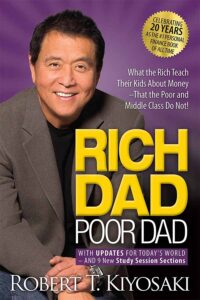
Rich Dad Poor Dad: What The Rich Teach Their Kids About Money That The Poor And Middle Class Do Not!
If you go back to the original concept, if we have the opportunity to keep that energy moving, it is worth more for us than if we have to stall and wait with that energy and can’t deploy it somewhere. That is the same thing with selling a business and buying a business. You have to be able to say, “This thing is going to keep spinning at the speed it is spinning, throwing off the cash it is throwing off, which can either be reinvested or harvested for something else. That is more valuable than a business where the flywheel is barely turning or it stopped. You have to put in all of this energy and effort again to get it to spin. That is a good example.
A business that has a strong flywheel that is spinning on its own and can fly under its weight is more valuable than one that is not. Even if you are paying four times as much as you pay for another business, there could be reasons to do so. In the example you gave, to pay two times for business, it feels like you are getting a “good deal.” I only paid two times for that business. For the rest of my life, I have to slave away at this thing to make it work right at that valuation. No, thanks.
What do you like? Do you like starting a business from scratch or acquiring a business that already has customers and cashflow? You can repurpose that or use your marketing skills and business operational skills to grow that from where it is at.
I like to aggregate resources. I can use it creatively in designing future deals, opportunities or new businesses or improving the existing business.
Explain aggregate. What do you mean?
It is like a tract in a way but it is more active. The Google or Facebook advertising businesses are aggregators. There is a great tech strategist. His name is Ben Thompson. He got a great blog. It is called Stratechery. It is a good one to check out. He put forward this thing called aggregation theory that explains why a lot of these platform businesses, Amazon, Facebook and Google, have been able to create such dominance in their space. It is because over time, through providing value and doing certain things, suck attention, business opportunity and pull these things towards them that they can utilize to continue to spin their flywheel.
What we are looking to do is attract or aggregate. To do that, we have to be providing value to these things, money, resources that are non-monetary like intellectual property or somebody that got access to a specific market, good relationships and talent, people that are talented at what they do. They are good operators and specific experts in different areas. We got to store these things in the bank of resources. We are constantly looking for things that we can connect the dots on, talented people that, ultimately, we could work with and different types of investors that we would want to partner with because we like the way they look at the world.
Business partnerships and investment partnerships are like marriages. You get to date a little bit. You got to understand what it is you want and what you need. For me, my approach is creating this field of options that we can connect the dots between. When we see that there is an opportunity to thread things together, that becomes that investible moment. For that to work well, one of the things that turn our flywheel at PermaVentures is this constant attraction and aggregation of resources. Those could be business ideas, people and all the different things that I mentioned.
What I get excited about is situations and investible moments where what we are pursuing or what is an opportunity set that is in front of us allows for the maximum amount of aggregation of those future resources, complete long-term play. There are resources that we had for a long period but never made any sense. There are relationships that I have built with people that I always wanted to be in business with and we have never gotten there until recently. There are people I have known for several years whom I have been building business relationships with them. I was like, “I would like to be in business with you at some point in time.” In 2021, we started a business together.
Business and investment partnerships are like marriages. You got to date a little bit. Share on XThe creative endeavor of finding what can pull people together around a specific goal, solve a creative challenge or provide value to the market is the thing that I’m excited about. Sometimes buying a business for cashflows is not super interesting to me. I’m not an operator so much, although I can operate a business and I have learned a lot through the years.
That provides a valuable resource, which is those cashflows, assets in the business, connections in an industry or a foothold into an industry we want to be in that we haven’t been in yet. I got into all this stuff because I wanted freedom from having to do the usual job. I wanted to be wealthy because I wanted to be able to do things for other people but primarily what I was looking for was the optionality that comes with resources. Pursue things you are interested in.
Do what you want to do with whom you want to do it when you want to do it.
The more resources that are available inside of that business, the higher valuation I would pay for it.
Dave, are you looking for investors for PermaVentures? If so, what does it entail?
That is a part of what we do regularly. We are continually working with other people, some of whom are capital-oriented, on future opportunities. If we launch a new business inside of one of our verticals, oftentimes, we will work together with another investor. We are constantly looking for people who think like we do and believe what we believe that would want to be involved in something that we are involved in.
Sometimes that looks like an investment financially but oftentimes, it is more of the other things. It is more at that level of being part of that creative team to bring something new into the world or to acquire something. If anybody’s going, “That guy is an idiot but I love what he is doing. I like to learn more. I like to be a part of what he is doing. I have this idea. I have this business. I’m trying to sell this thing. I’m trying to get this thing started. I got this weird market that I have been involved with for a long time. I see that investible moment you talked about,” those are the kinds of people we want to talk to.
How did they find you?
I’m on Twitter @DaveKrock. Our website is Perma.Ventures. That is our main website. You can get in touch with us there. There is an awesome form you can fill out talking about what is interesting to you, what you are focused on and how we can help.
Dave, we could probably talk for another 3 to 4 hours on this subject but we do need to shut it down. Thank you so much for all your wisdom. All our readers are clear. Dave is a smart dude. Thank you for your wisdom.
No problem.
That is a wrap. Thank you so much for joining us. We will see you in the next episode.
Important Links
- Dave Krock
- Rich Dad Poor Dad
- Stratechery
- @DaveKrock – Twitter
- https://Bit.ly/3xjGFQ7 – Building Indestructible Wealth: The Six Figure Earners Guide to a Multimillion-Dollar Portfolio


